Video Transcription
If you’re a wholesaler or a real estate agent that’s looking for motivated sellers, I’m going to show you how to grow your real estate business into multiple markets, get leads for $20 to $30 per lead and cut your Google pay per click ad costs by 50% to 75% by going regional or national in this video right here.
So guys and gals, a couple of weeks ago, I was talking with one of our clients that they were pulling in leads from Google pay per click for somewhere between $20 to $30 bucks a lead.
Now, you can even, I’ve heard stories of $10 bucks a lead, $50 bucks a lead, the whole thing.
The thing they did was they went from just being a local investor or local hybrid agent investor, looking for sellers in one market, to they expanded to national.
So, now they’re using their Carrot website for national lead generation.
So, what I’m going to do in this video is I’m going to walk you through it. We’re going to dive into my iPad.
I will show you how to go from a local website with Carrot to regional or statewide.
And then if you wanted to expand to national, they’re all completely different business models, so I’m not saying that you should do it because you have to then figure out, of course, all the different moving parts of how to turn those leads into deals, how to analyze deals in different markets, the whole thing.
We’re not going to cover that in this video. We’ll cover that in some other videos. But let’s dive into the iPad because we’re going to show you exactly how to set up your Carrot website, depending on whether you’re local, regional, state, or national.
Let’s dig in.
How to Grow Your Real Estate Business Into Multiple Markets
So, we’re right here on the iPad. The very first thing, this is where most of our clients are, most of our clients are in the local bucket. Meaning, you’re in one market, you’re in Cincinnati, you’re in Tampa, you’re in Roseburg, Oregon. You’re in Phoenix, Arizona.
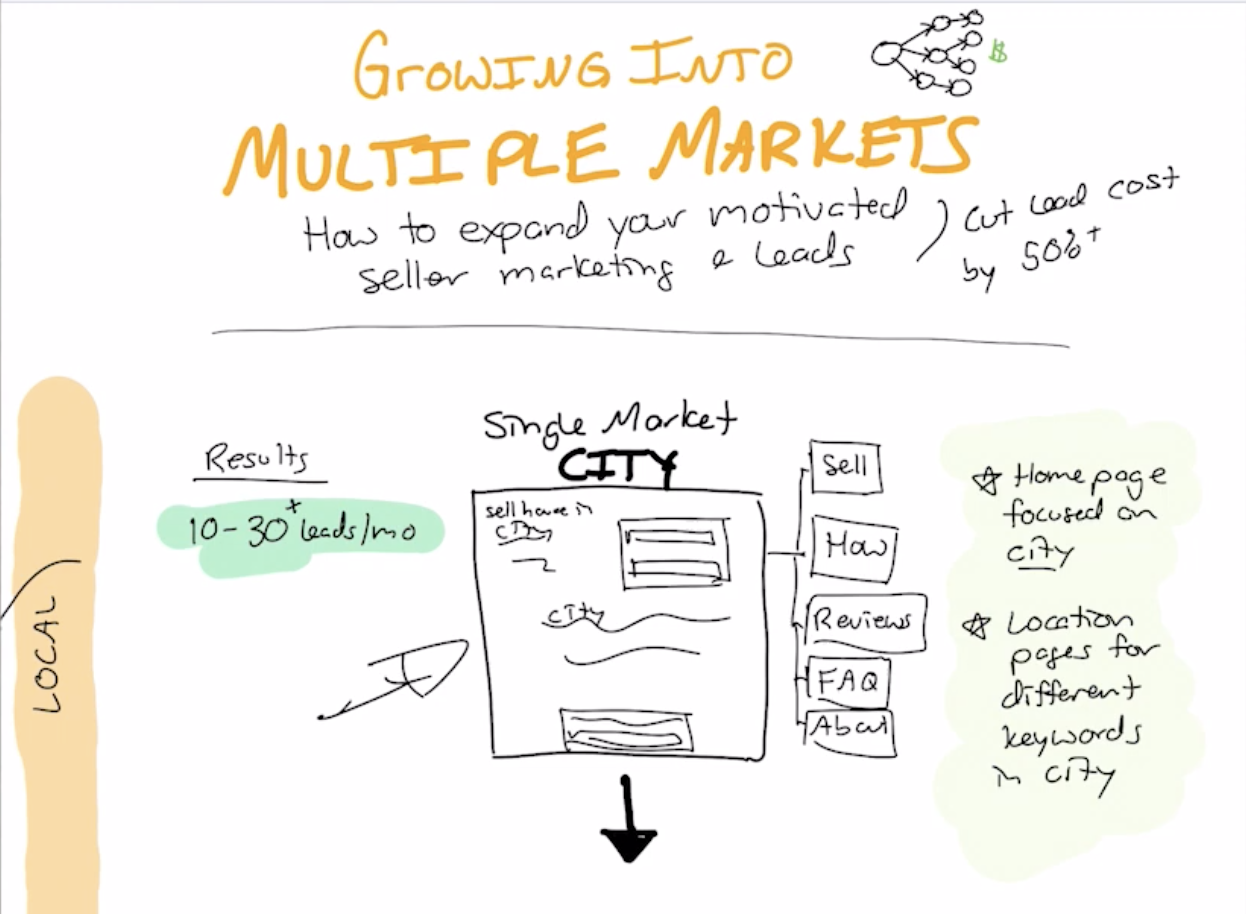
Of course, the bigger the city, the more opportunity there is to pull more and more leads out of the city because the population’s higher.
So, in a single city market, your website’s pretty much going to look like this. You’re going to have your homepage right here and it’s going to be, “Sell your house in city.”
Pretty much those types of phrases. Over here, you’re going to have your standard, what we call authority hub pages, which is your “sell a house” page.
It’s going to have a call to action on it. Your “how it works” page. Reviews page with testimonials to build trust and credibility, maybe some FAQ, and then you’re about page and contact pages. That’s what we call the core conversion pages here at Carrot.
To be in one city, that’ what you need.
That’s pretty much all that you need.
You can use our tools and systems then add automated blog posts, or to use our video post feature, to build further trust and credibility. But that’s how you would lay it out.
Your homepage is focused on the city at that point, sell your house fast in Cincinnati. And then you would talk about that, show Cincinnati pictures.
Your location pages might be set up for different keywords in that city. So, maybe you set up a location page for cash home buyers in the city, or sell your inherited house in Cincinnati. That’s how you’d leverage that.
So, let’s say now that we wanted to expand out beyond that one location. If you’re in a city, you can pretty much expect somewhere between 10 and 30 leads a month once you get the SEO and/or Google pay per click launched in that one area.
It depends on the population and your market.
If you’re in a 10,000 person city, then you’re probably going to be maybe three, four, five leads a month from Google PPC or SEO.
If you’re in a two million person population market, you might be able to get 30 to 50 leads a month, if you’re ranking really in Google and doing some Google Ads.
Regional or State Website Strategy
So, now we’re going to move into the regional or state set up on your website.
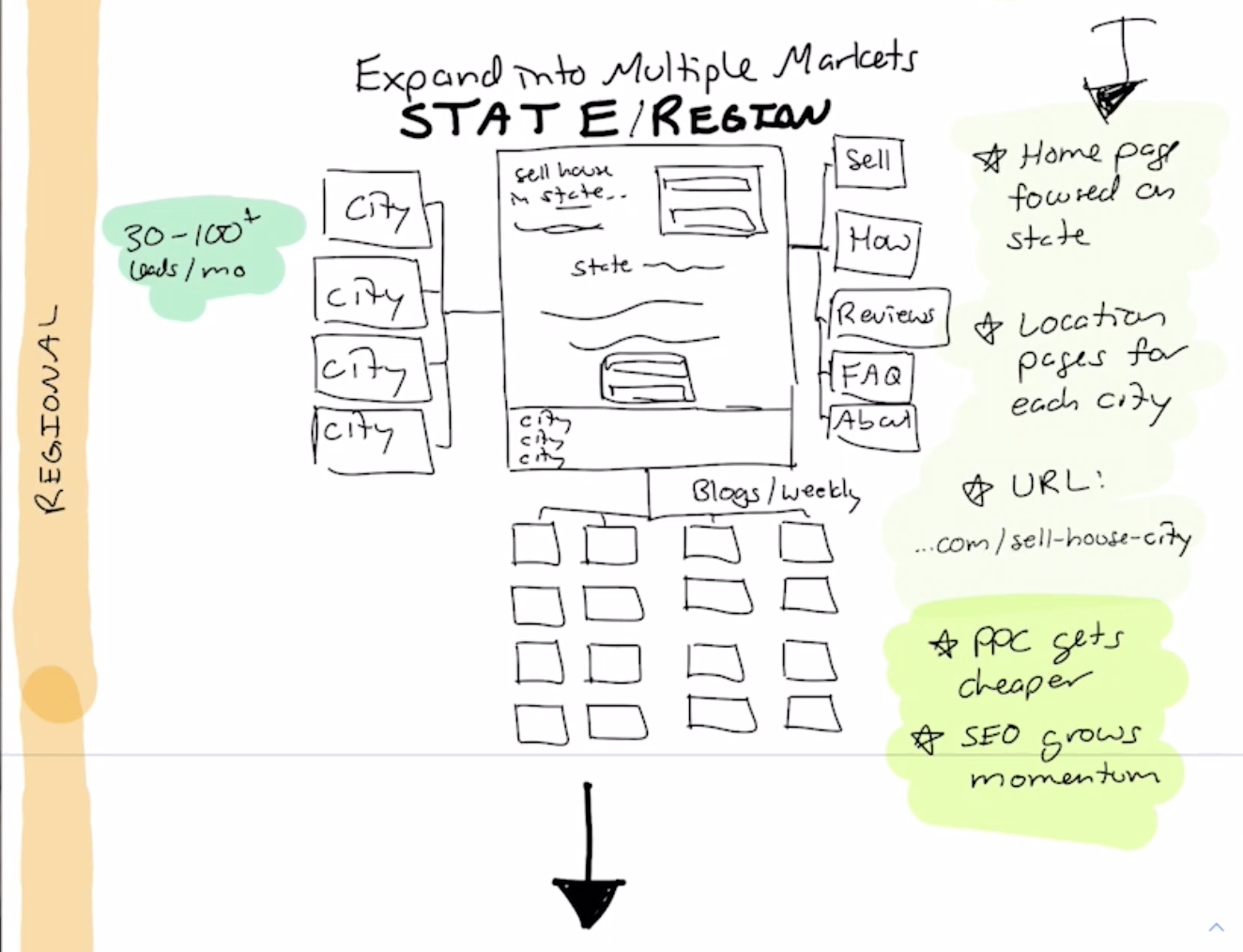
The regional or state set up on your website is basically going to be kind of like this, the only real core differences are your homepage now, your homepages focus on the state.
So, rather than your homepage focus on just one city, we’re going to focus on the entire state or the entire region that you operate in.
If you’re in the entire state of Texas and you have four prime cities, Austin, San Antonio, Dallas, and Houston, as an example, then you’re going to have your homepage be, “Sell your house fast in Texas,” basically.
Then you’re going to have pictures that have a broad array of pictures of the different markets that you buy houses in, or that you’re a real estate agent and/or an investor in.
Then down at the bottom of your website, you’re going to have a link to your prime cities in that state.
You might link up to five, six, seven, eight of your cities to those city location pages.
Over on the left side, those are what we call location pages. So, you’re going to set up a new page for every single location or every single city in that state. Sell my house fast, Dallas. Sell my house fast, San Antonio. Sell my house fast, Katy, Texas. Whatever those cities are.
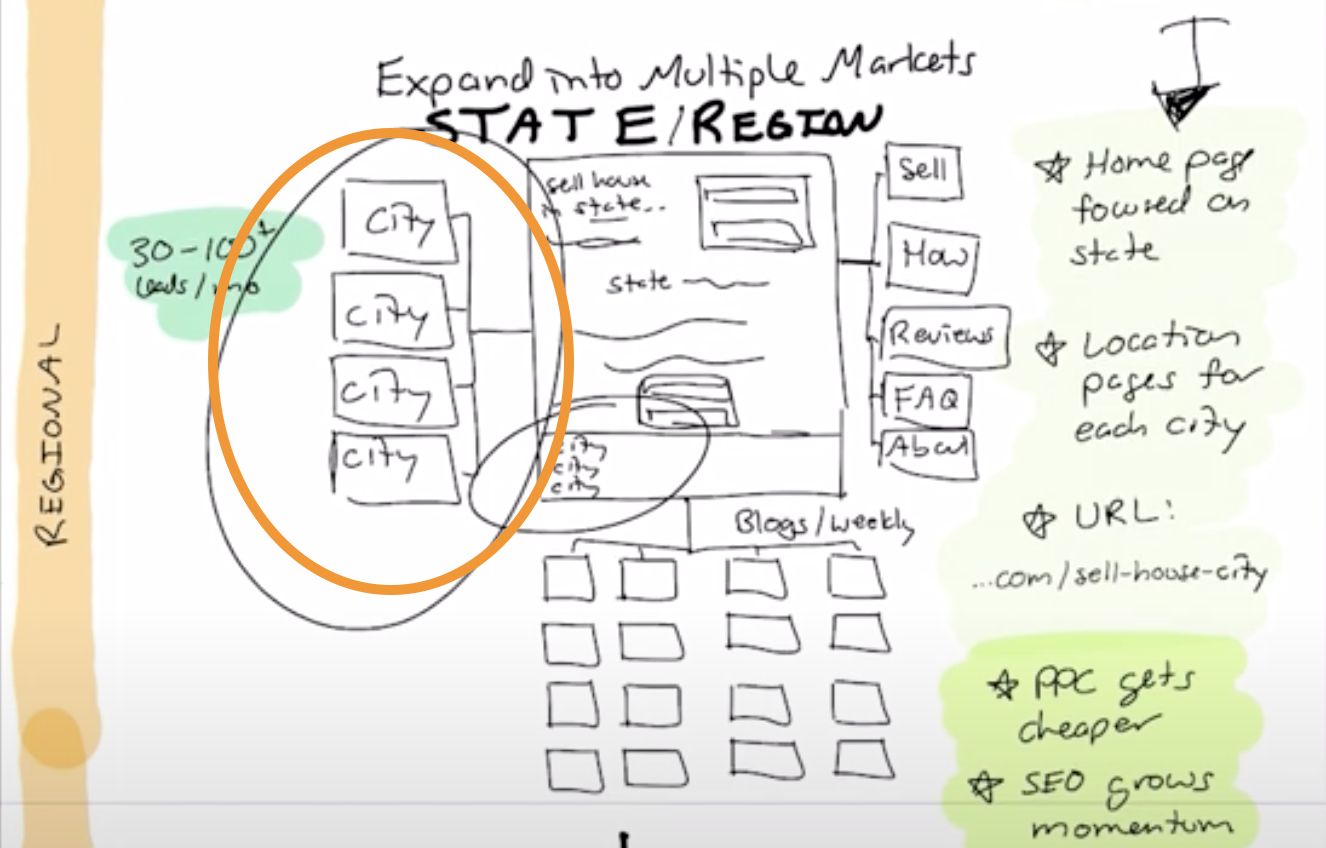
I want you to focus on just looking at those on a quarterly basis. Every quarter, do I need to add any new city pages or location pages within this state?
Now, let’s say you’re in three, or four, or five states. You’re in a region. Your homepage would then be, “We buy houses in the tri-state area,” or look for tri-state investment properties.
Then on the homepage, talk about the three states you do business in and maybe some of your primary cities. Then you would create pages for states and cities.
Some advantages here, your homepage is focused on the state. You can start to rank really well at the state level and at the city level.
Location pages for each city, like I said, now you can get those rankings in Google for each city. Your URL is going to look kind of like this, whatever it is .com, forward slash, sell your house in X, Y, Z city.
Your PPC, this is where is where the lead costs get lower. If you’re marketing, doing Google PPC in just one market, your PPC cost is going to be the most it can possibly be because you don’t have a very broad targeting there.
The broader you’re targeting, the lower your click cost tends to be.
But once you start to get down in here into the state and region, and you’re marketing a wider audience, your PPC gets cheaper and your SEO momentum actually grows because now you’re setting up multiple pages in multiple cities, the 10th location page, 11th, 12th, 15th, ninth, whatever it is.
As you built up the SEO and your overall domain name, each one of those is going to rank in Google faster and faster and faster.
So, a lot of people ask, should I set up multiple websites? Should I have a website for every city?
And my suggestion is, if it’s all for motivated house sellers and you are okay with having one unified brand that will work well in all those cities, then I would suggest setting up the one motivated house seller website that encompasses all of those cities because the SEO juice is going to feed into every location page you create, and they’re going to rank faster and quicker.
National Website Strategy
So, now let’s say you want to go to the national.
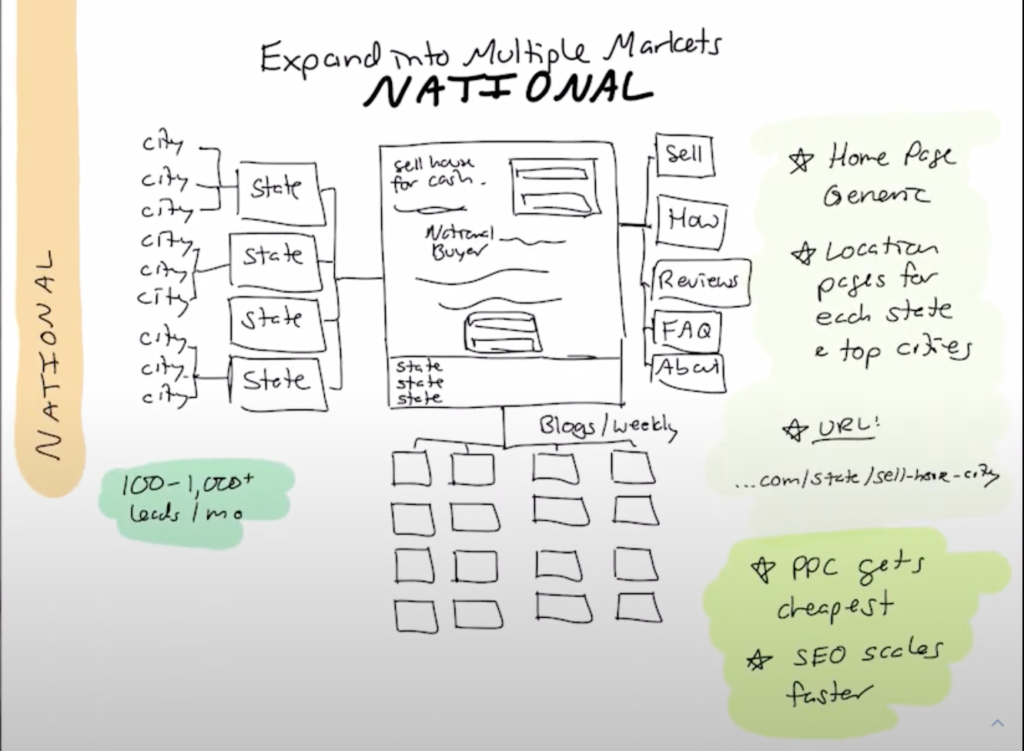
We have a lot of our clients using Carrot to do national house buying, national investment property websites, things like that.
The main difference that you’re going to do here is your homepage now is going to be more generic.
So, rather than sell your house fast in Cincinnati or sell your house fast in Ohio, now it’s going to be “sell your house fast”, “how to sell your house fast for cash”, or “we will make you a cash offer on your home.”
Then on that homepage, you’ll talk about that “we buy all around America” and then you might have a link to maybe some of your primary markets that you buy in.
Link up to some of those states or some of the cities that are the primary markets that you buy in.
Now what we’re going to do with our location pages is this, instead of creating location pages for a city at the root level, we’re going to create location pages for each of your primary states.
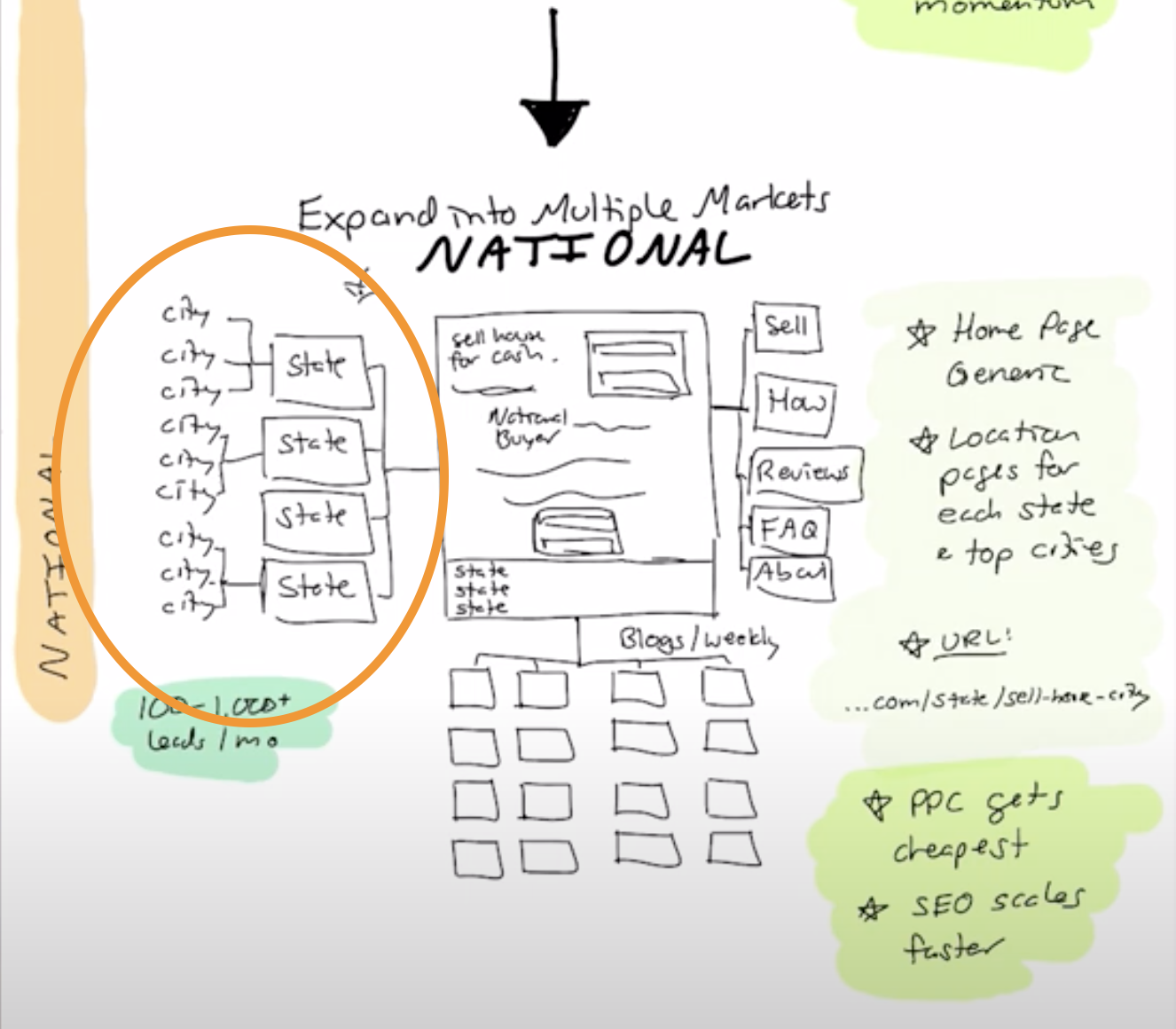
Let’s say you’re a national buyer, but you focus on 10 states. Create a location page for each one of those states. It could be “sell my house fast Florida”, or sell my house fast Georgia.” Basically, it’s “sell my house fast, insert state.”
Now what you’re going to do is create city pages for each one of those states, which are the primary cities in the state that you buy in.
If it’s Florida and your primary cities are Tampa, Orlando, and Jacksonville. You’re going to create a Jacksonville page, sell my house fast in Jacksonville. For Orlando, you’re going to create an Orlando page, sell my house fast in Orlando. You’re going to do the same thing for Tampa.
Those would be underneath the state of Florida. This is what it would look like over here on the URL. It’d be your site .com, forward slash whatever that state is.
So, that’d be Florida, forward slash Florida, and then forward slash sell my house fast Tampa.
That would be the name of that page, sell my house fast Tampa. The name of that page would be Florida, or sell your house in Florida. That is your structure.
Your PPC gets the cheapest here with this strategy. Now, this is where you’re going to start to get your $20 cost per lead. Your $30 cost per lead. Your $50 cost per lead in Google, in the exact same markets, that before you might have been paying $80 bucks, a hundred bucks, $150, $200 per lead in the exact same market.
You might be saying, “Why is that? Why does the cost per lead in Google Ads get so much cheaper?” Or even Facebook if you go broader. Because you’re targeting a wider audience and when you target a wider audience, Google actually has more data to feed back into your campaign to get your click costs and lead costs lower.
Your SEO scales way faster too.
If you already have 10 20, 30 location pages, and you have some SEO juice on your website.
When you set up that new page and that new market, it’s going to get ranked really, really fast, because you’ve already done all of this work.
Creating this amazing national website with the state pages and the city pages, and you’re eight months in, a year in, two years in.
Google loves your site. They see you as an authority, it’s got some great link juice. Every single page ranks faster now.
At this level (national), you can expect 100 to 1,000 leads a month, depending on how well you’re doing the marketing. At the state and the region, you can expect between 30 and a hundred leads a month. Of course, depending on how well you’re doing your marketing and SEO and PPC.
Recap: How to Grow Your Real Estate Business Into Multiple Markets
Let me recap real quick.
The best way to expand from local to national is to create a new cadence or new setup with your location pages.
You go city and then state, and then also you start to scale out your Google Ads. Because as you scale out your Google Ads to more states, more locations, they get cheaper and cheaper.
And that’s how the big lead generation services do it. That’s how our biggest clients do it and get way more leads at a way cheaper cost because they’re going national.
Check out our other videos in this series and on our YouTube channel.
Hit the subscribe button on our YouTube channel because every single month, we put out new content that teaches you how to be an investor or an agent, or a hybrid investor agent, and generate more leads more consistently in an evergreen fashion on the internet.
You can finally get more freedom, finally, make a greater impact with your business. Go to carrot.com/evergreen to check out our webinar on the topic of evergreen marketing. If you enjoyed this video, we’re going to dive way deeper into that training.
Go to carrot.com/evergreen. Have an amazing rest of the week, like and subscribe to this video, we’ll see you in the next video.
